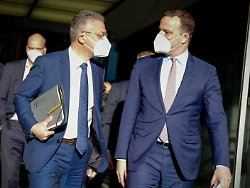Friday, December 03, 2021
Last joint BPK with Wieler
Spahn expects “sad climax at Christmas”
In what is expected to be the last joint Federal Press Conference (BPK), Health Minister Spahn and RKI boss Wieler defend the decisions of the federal and state governments. The worst is still to come, both emphasize – especially in hospitals. The vaccination campaign, however, gives hope.
The acting Federal Minister of Health Jens Spahn justified the far-reaching corona restrictions for unvaccinated people in Advent. “If all adult Germans were vaccinated, we would not be in this difficult position,” said the CDU politician, referring to the significantly higher proportion of unvaccinated people among infected and intensive care patients. The incidences of unvaccinated people in all age groups are significantly higher than that of unvaccinated people.
The federal-state resolutions on stricter measures made it clear: “Germany is taking the situation seriously.” These decisions came late, but at least they were made. They should now be implemented. Even if the measures showed full effect tomorrow, the hospital loads would increase, said Spahn. Germany will significantly exceed the number of more than 5000 corona patients in intensive care units in the next few days and weeks. The situation will “reach its sad climax around Christmas”.
With a view to the vaccination campaign, Spahn emphasized that the decision not to be vaccinated not only has consequences for oneself, but also for other people. RKI boss Lothar Wieler followed up there and made it clear that the high utilization of intensive care units in German hospitals would initially affect patients with minor operations, such as someone who needs an artificial hip. Many operations have already been postponed. But it would be particularly serious if severe cases, such as cancer patients, were not treated. Delays in examinations or even operations lead to significantly worse chances of recovery, according to Wieler.
Spahn said he would ask everyone: “Help prevent further suffering.” All citizens should comply with requirements and reduce contacts. It is also not about exhausting every rule. The vaccination campaign is picking up speed again and is approaching daily record numbers in early summer. Spahn emphasized that enough vaccine was available for the goal of up to 30 million vaccinations by the end of the year.
Spahn said the inoculation of all available cans would be the “greatest Christmas present”. He made it clear that the announced 30 million vaccine doses will be counted from November 18. Since then, a good ten million vaccine doses have already been administered, Spahn continued. He thanked the medical staff that vaccinations are currently being demanded more intensively. Spahn emphasized that the vaccination campaign is currently going very well again – a total of two million doses would have been vaccinated in the last two days. According to the Minister of Health, a third of those over 60 have already been boosted. A total of 12 million booster vaccinations have already been vaccinated.
Wieler: Be careful with the “plateau”
RKI boss Wieler warned that the decided measures should now be implemented consistently. Unfortunately, this has often not happened in the past. This is more important than ever, especially with regard to the new Omikron variant. Wieler considers the recently discovered variant to be more infectious than the recently dominant Delta variant. “Omikron has arrived in Germany,” said Wieler.
He also warned against misinterpretation of the current sideways movement (“plateau”) in the number of infections. He said that whenever the numbers fell in the past, measures would have been eased. This in turn led to the number of cases then rising again. In addition, Wieler made it clear that the effects of the currently very high number of infections will be reflected in the intensive care units with a time delay in around two weeks. That is when the seriously ill patients are admitted to the intensive care unit. “The loads will continue to increase,” said Wieler. Spahn also added that currently the poor staffing levels in both the laboratories and the health authorities mean that there are considerable delays in the registration of new infections. For this reason there are always late registrations.
The federal and state governments adopted a series of stricter measures for the Advent season yesterday, Thursday. These include audience restrictions at major events and extensive contact restrictions for those who have not been vaccinated. You will also be denied entry to most shops during the Christmas season. The sale of firecrackers and fireworks on New Year’s Eve is banned nationwide. According to the Robert Koch Institute (RKI), the number of new infections per 100,000 inhabitants in seven days rose to 442.1 after a slight decrease on the previous days.
